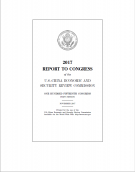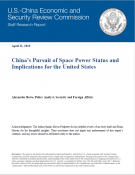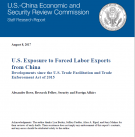×
Filter Results
Filter Results

Research
The U.S.-China Economic and Security Review Commission invites submission of proposals to provide copyediting and proofreading services to the Commission. Electronic or hard copy proposals must be received by 5:30PM EST on January 22, 2018.


Research
The U.S.-China Economic and Security Review Commission submission of proposals to provide a one-time unclassified report on the U.S. role in China’s biotechnology development. Electronic or hard copy proposals must be received by 5:30PM EST on January 10, 2018.

Research
The U.S.-China Economic and Security Review Commission invites submission of proposals to provide a one-time unclassified report on China’s Internet of Things. Electronic or hard copy proposals must be received by 5:30PM EST on January 5, 2018.




Staff Paper
As space becomes more “congested, contested, and competitive,” as termed in the 2011 U.S. National Security Space Strategy, efforts by spacefaring nations to establish norms of behavior in space have become increasingly important. This issue brief examines China’s views on the Code of Conduct for Outer Space Activities proposed by the European Union, finding that Beijing instead continues to support a binding treaty that would ban the deployment of weapons in space, which it has jointly proposed with Russia. This treaty would significantly limit U.S. activities in space while doing little to reduce actual threats to space assets. China’s actions in regards to codes of conduct in other areas indicate it sometimes uses negotiations to prolong the status quo, and does not always adhere to its agreements. Should China continue to place a high value on developing military counterspace capabilities, its position should be expected to remain unchanged.


Staff Paper
China maintains a network of prison labor facilities that use forced labor to produce goods intended for export—a violation of U.S.-China trade agreements and U.S. law. The United States continues to face difficulty in preventing these products from entering its borders, but the Trade Facilitation and Trade Enforcement Act (TFTEA) of 2015 has strengthened its ability to do so by closing a major legal loophole. Chinese authorities remain uncooperative with their U.S. counterparts; they routinely deny that forced labor occurs, and they have not allowed U.S. officials to visit suspected sites in years. Due to insufficient oversight, the supply chains of many U.S. companies remain vulnerable to forced labor-derived products.
